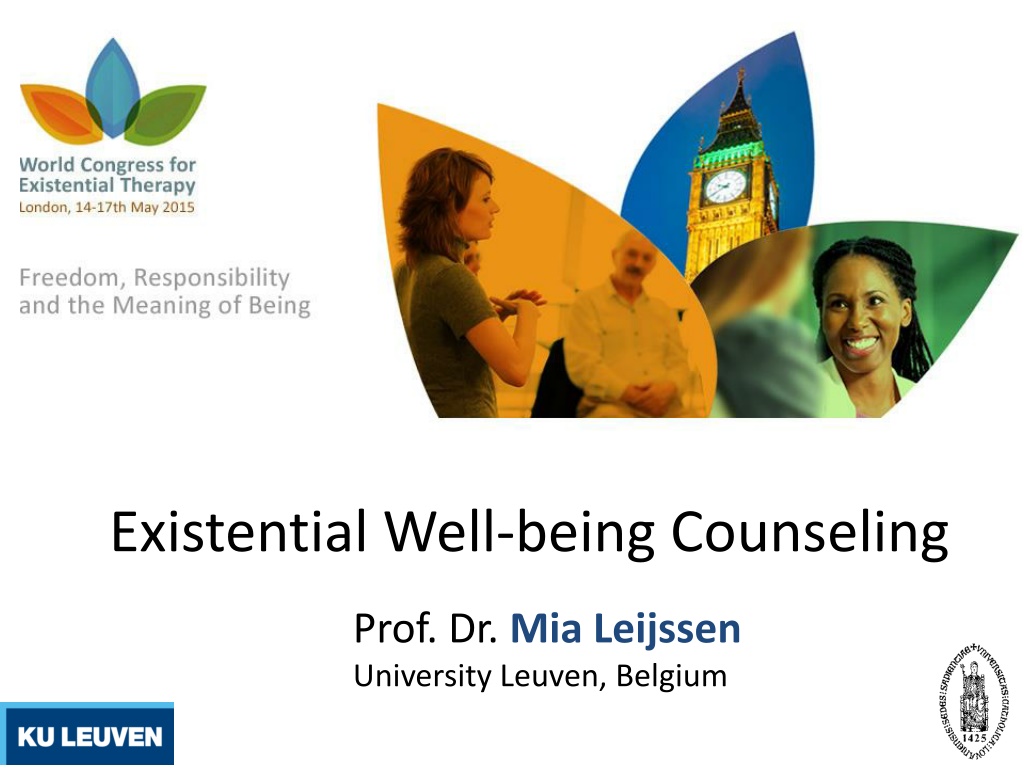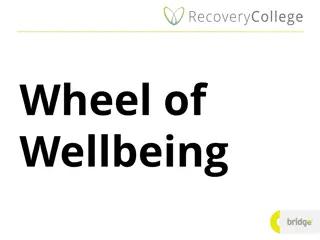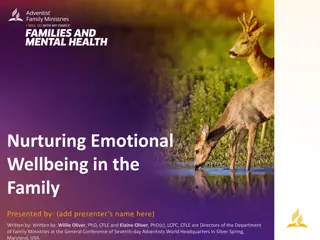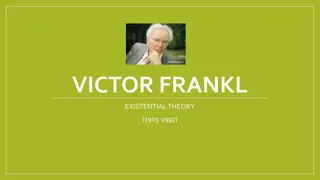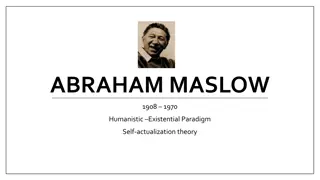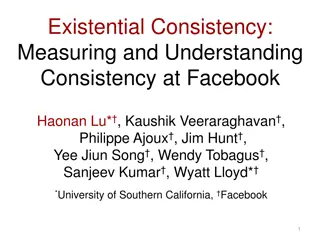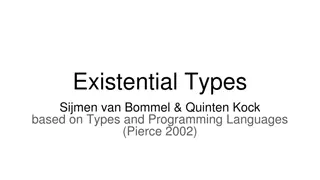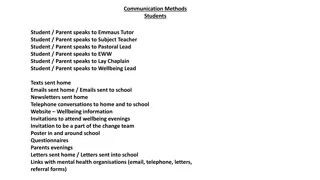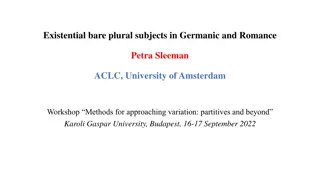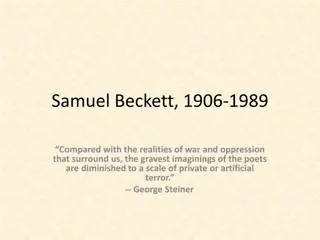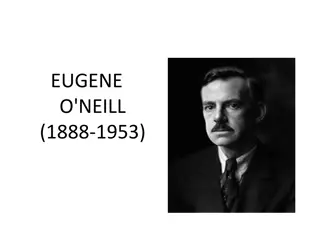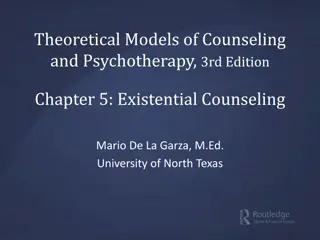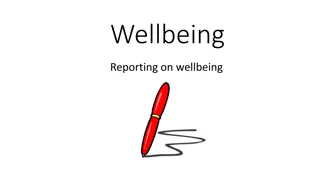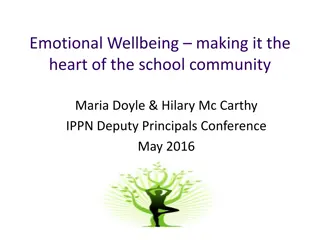Explore Existential Well-being with Prof. Dr. Mia Leijssen
Dive into the realm of existential well-being through experiential exercises and reflections guided by Prof. Dr. Mia Leijssen from the University of Leuven, Belgium. Explore the dimensions of human existence – physical, social, psychological, and spiritual – to discover more about yourself and your place in the world.
- Existential well-being
- Prof. Dr. Mia Leijssen
- University of Leuven
- Human existence
- Experiential exercises
Download Presentation

Please find below an Image/Link to download the presentation.
The content on the website is provided AS IS for your information and personal use only. It may not be sold, licensed, or shared on other websites without obtaining consent from the author. Download presentation by click this link. If you encounter any issues during the download, it is possible that the publisher has removed the file from their server.
E N D
Presentation Transcript
Existential Well-being Counseling Prof. Dr. Mia Leijssen University Leuven, Belgium
Experiential exercise: Existential well-being I will offer you a few questions so that you can capture a little bit of the salience of existential well-being in your life. We start with friendly and welcoming attention in the middle of your body, giving yourself good company and listening, the same as you would give support and empathy to your best friend.
Visualize your life as it is for the present time and ask yourself the question: 1. Who am I? Take notice of all possible answers that pop into you. Repeat the sentence I am with several statements. You should have at least ten statements that say something about you or what you feel like to identify with.
2. In what do you invest your time, energy, money ? 3. About what are you worrying in your life ? 4. What gives you joy, pleasure, happiness, peace, strength, courage in your life ?
Dimensions of human existence Physical Social Psychological Spiritual
http://extension.umd.edu/family/index.cfm Social dimension
Dimensions of Human Existence (Leijssen, 2014; van Deurzen, 2009) Physical Social Psychological Spiritual Deals with Body Material world Nature Place in society Relations Identity character traits Thinking and feeling Soul Meaning Self-transcending ideals I AM Values Health Safety Comfort Esteem, succes Connection Autonomy Freedom Knowledge Authenticity A better world, Consciousness of unity Being values ENERGY, time, money Threats Pain, sickness Death Poverty Rejection Loliness Guilt, shame Confusion Doubt Imperfection Meaninglessness Futillity Evil WORRIES JOY Perenial philosophy BEAUTY GOODNESS TRUTH LOVE
Essential principles of existential well-being 1. Complexity of human existence: physical, social, psychological, spiritual. 2. Existential well-being implies sufficient attention for each dimension, not too much, not too little.
3. The starting point is experiential: focusing on the bodily felt meaning. 4. Integration of diverse humanistic/existential theories and spiritual traditions.
5. Positive Psychology. A process-oriented approach to human strengths, talents and virtues. It should not be understood as a call to ignore negative aspects of human experience. But rather how positive and negative experiences may be interrelated. Gendlin: Every bad feeling is potential energy toward a more right way of being if you give it space to move toward its rightness."
The ability of human beings to form loving bonds is possibly one of their greatest strengths. (Aspinwall & Staudinger, 2002)
Example of a strength Love = connection in different dimensions Physical: being part of nature; respecting and enjoying the body and it s needs; connection with the material/physical world. Social: authentic connection with others; genuine commitment to social tasks. Psychological: connection with oneself; self- knowlegde; self-acceptance; rich inner life. Spiritual: connection to something that transcends the limited self; love as being.
Case example from psychotherapy Performance anxiety brings a young woman to therapy. Whenever she is asked to play music in public, her hands start shaking so badly that she is no longer able to play the piano. How can it be helpful to address different dimensions of human existence?
Physical dimension We explore how in her self-experience she locks herself up in the physical dimension when she starts fearing that her hands will not be able to find the right keys.
Social dimension In the social dimension she recognizes that during her childhood playing music was her way of having a relationship with her grandmother who was a musician as well. Actually she has no need whatsoever for the admiration of an audience for her musical talent.
Psychological dimension In the psychological dimension she experiences music as a game in which she can express her emotions and fully indulge when she is alone. It is an important source of satisfaction and expression of her inner world.
Spiritual dimension A dramatic change occurred when the client can experience how she would feel from a spiritual perspective if she imagined that she may play music for an audience. She suddenly felt that the beauty of music was a universal gift that filled her with gratitude.
A week after this session, she reported about a performance during which she had imagined that her Selfless Self was playing and singing through her. This performance had become a peak experience during which the audience no longer appeared to be a critical judging ear, but a supporting presence. Ever since that moment, her performance anxiety had completely disappeared.
Experiential exercise Addressing a specific situation or a problem from different dimensions of human existence.
Illustration: Migraine How does the migraine affects you as a physical being? I m no longer able to move. I lose my vitality. The chronic pain shapes my life. How does it affect you if you could stay in a friendly way with your body that suffers? It brings tenderness and a feeling of relief.
How does the migraine affects you as a social being? I learned from generation to generation to hide the pain and just go on working. How does it affect you when other people acknowledge that migraine is a real suffering? It makes it less shameful. Less isolated. It restores the connection with others. It means that I m no more pushed to hide my personal feelings.
So we move naturally to the psychological dimension. What are your most dominant personal feelings? Hopelessness. In what way is your hope cut down by the migraine? I always hope something helpful will come from the outside, like new medication. Every time I hope: this will work. And then it doesn t. I m so naive. I trust in something which is outside me, not in me.
Then the spiritual dimension is invited by asking: In what do you really trust? My first feeling is: I have no idea! Take your time to sense how your body reacts to this question. What is your felt sense about what you can trust? I trust that the seasons in nature have an order. After the winter, the spring will come. When I m gardening, I feel trust. There is order in life, something bigger than my life. When I sense that, I can feel also the order in my life. I m part of nature. That s really helpful. That brings relief and lightness.
References Leijssen, M. (2014). Existential wellbeing counselling. In Madison, G. (Ed). Emerging Practice in Focusing- Oriented Psychotherapy. Innovative Theory, Applications and Practice. London: Jessica Kingsley Publishers. Pp. 142-157. van Deurzen, E. (2009). Psychotherapy and the Quest for Happiness. London: Sage. Ward & Reuter (2011). Strength-centered Counseling. Sage, London.
Thank you mia.leijssen@ppw.kuleuven.be www.existentialwellbeing.com
